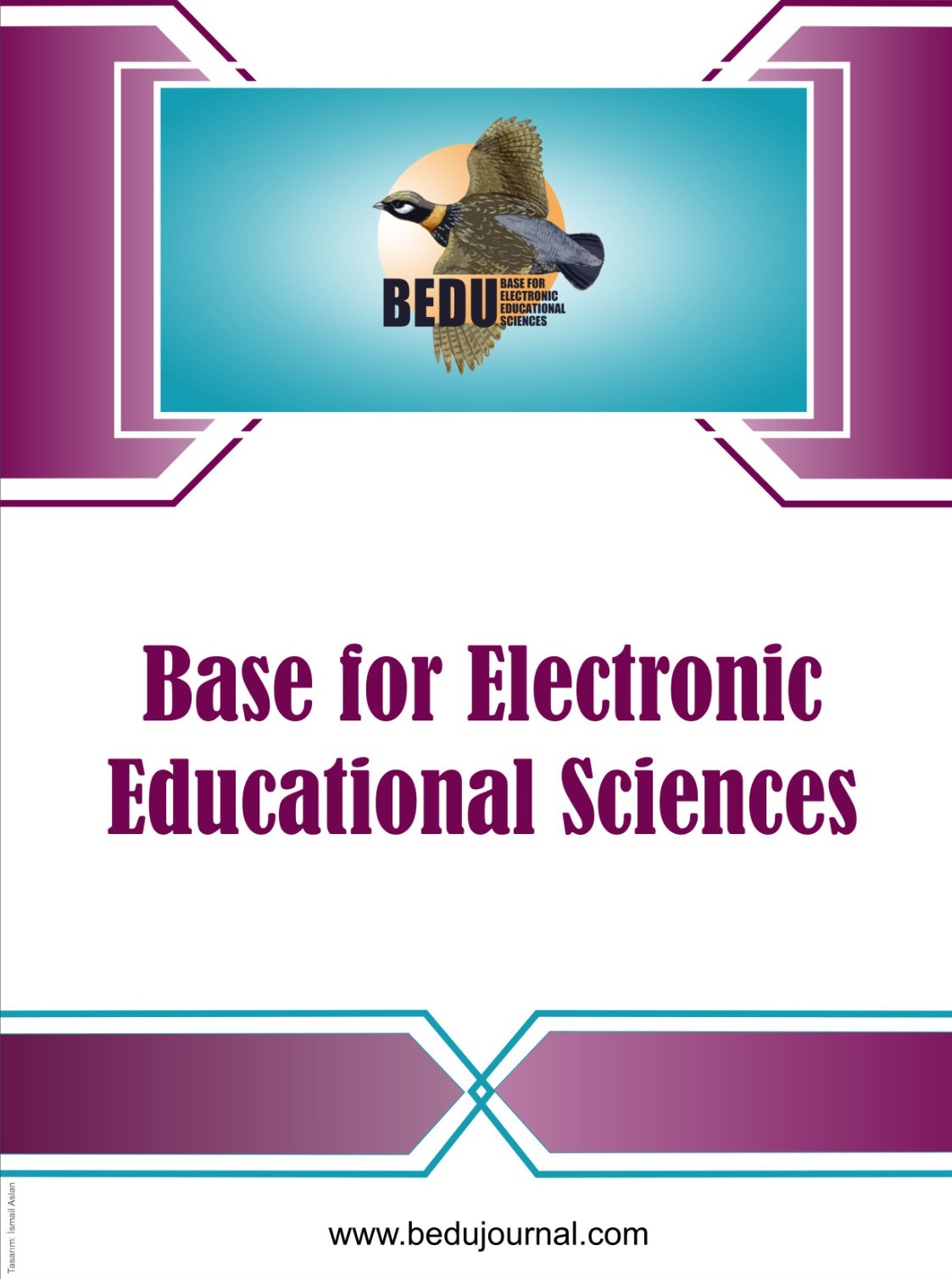Research article | Open Access
Base for Electronic Educational Sciences 2023, Vol. 4(2) 30-41
Investigation of Metacognitive Reading Strategy Use for Items Constructed at Different Cognitive Processes
pp. 30 - 41 | DOI: https://doi.org/10.29329/bedu.2023.597.3
Publish Date: September 15, 2023 | Single/Total View: 121/500 | Single/Total Download: 146/838
Abstract
Reading comprehension skill is very important for students as it is what individual needs throughout his/her whole life and must meet certain standards socially and academically. In the literature, there are studies investigating the relationships between reading comprehension and metacognitive strategies. With this study, it is aimed to reveal whether students use different metacognitive strategies in their reading comprehension skills at different cognitive levels (focusing on and retrieving explicitly stated information, making straightforward inferences and evaluating and criticizing the content and textual elements). The study group consists of 69 seventh grade students. Reading comprehension test, rubric and Metacognitive Reading Strategies Scale were used to collect data. In data analysis, cross tables were created. According to the cross tables, the metacognitive reading strategy most used by the students while answering the items at all cognitive levels is the reading strategy based on problem solving. According to internal interpretations, students' strategy use according to cognitive level may be related to students' inexperience in using strategies, their low performance in reading comprehension success or their unawareness of metacognitive strategies. External interpretations are discussed with studies using the same measurement tool in the literature and studies investigating metacognitive reading strategies and reading comprehension.
Keywords: Meta cognitive strategies, reading comprehension, reading strategies, achievement test.
APA 7th edition
Ozyeter, N.T. (2023). Investigation of Metacognitive Reading Strategy Use for Items Constructed at Different Cognitive Processes. Base for Electronic Educational Sciences, 4(2), 30-41. https://doi.org/10.29329/bedu.2023.597.3
Harvard
Ozyeter, N. (2023). Investigation of Metacognitive Reading Strategy Use for Items Constructed at Different Cognitive Processes. Base for Electronic Educational Sciences, 4(2), pp. 30-41.
Chicago 16th edition
Ozyeter, Nesli̇han Tugce (2023). "Investigation of Metacognitive Reading Strategy Use for Items Constructed at Different Cognitive Processes". Base for Electronic Educational Sciences 4 (2):30-41. https://doi.org/10.29329/bedu.2023.597.3
Ahmadi, M. R., Ismail, H. N. & Abdullah, M. K. K. (2013). The importance of metacognitive reading strategy awareness in readng comprehension. English Language Teaching, 6(10), 235-244.
Akyol, H. (2007). Okuma: İlköğretimde Türkçe öğretimi. A. Kırkkılıç ve H. Akyol (Ed). Ankara: Pegem A Yayıncılık
Ateş, A. (2013). Üniversite öğrencilerinin okuma stratejileri üstbilişsel farkındalık düzeyleri: İnönü Üniversitesi örneği. Uluslararası Türkçe Edebiyat Kültür Eğitim Dergisi, 2 (4), 258-273.
Başaran, M. (2013). 4.sınıf öğrencilerinin üst bilişsel okuma stratejilerini kullanma durumları ve bu stratejilerle okuduğunu anlama arasındaki ilişki. International Periodical For The Languages Literature and History of Turkish or Turkic, 8(8), 225-240.
Büyüköztürk, Ş., Kılıç Çakmak, E., Akgün, Ö.E., Karadeniz Ş. ve Demirel, F. (2014). Bilimsel araştırma yöntemleri (18. baskı). Ankara: Pegem Akademi.
Creswell, J. H. (2009). Research design: Qualitative, quantitative and mixed methods approaches. USA: Springer
Demirel, Ö. (1999). Türkçe öğretimi. Ankara: Pegem A Yayıncılık
Ghaith, G., & El-Sanyoura, H. (2019). Reading comprehension: The mediating role of metacognitive strategies. Reading in a Foreign Language, 31(1), 19-43. http://nflrc.hawaii.edu/rfl
Karasar, N. (2010). Bilimsel araştırma yöntemleri (21. baskı). Ankara: Nobel Yayıncılık.
Karatay, H. (2010). İlköğretim öğrencilerinin okuduğunu kavrama ile ilgili bilişsel farkındalıkları. Türklük Bilimi Araştırmaları Dergisi (TÜBAR), 25, 457-475.
Melanlıoğlu, D. (2011). Üstbiliş stratejileri eğitiminin ilköğretim ikinci kademe öğrencilerinin dinleme becerilerine etkisi. Yayımlanmamış Doktora Tezi, Gazi Üniversitesi, Eğitim Bilimleri Enstitüsü. Ankara.
Meniado, J. C. (2016). Metacognitive reading strategies, motivation, and reading comprehension performance of Saudi efl students. English Language Teaching, 9 (3), 117-129.
Mete, G. (2012). İlköğretim 8. sınıf öğrencilerinin okuma alışkanlığı üzerine bir araştırma (Malatya il örneği). Dil ve Edebiyat Eğitimi Dergisi, 1(1), 43-66.
Mokhtari, K. & Reichard, C. A. (2002). Assessing students’ metacognitive awareness of reading strategies. Journal of Educational Psychology, 94, 249–259.
Muhid,A., Amalia, E. R., Hilaliyah, H., Budiana, N., & Wajdi, M. B. N. (2020). The effect of metacognitive strategies implementation on students’ reading comprehension achievement. International Journal of Instruction, 13(2), 847-862. https://doi.org/10.29333/iji.2020.13257a
Mullis, I. V. S., Martin, M.O., Gonzalez, E.J. ve Kennedy, A.M. (2003). PIRLS 2001 international report. Boston: International Study Center, Lynch Schhol of Education, Boston College
Mullis, I. V. S., Martin, M. O., Kennedy, A. M. ve Foy, P. (2007). PIRLS 2006 international report. Boston: International Study Center, Lynch Schhol of Education, Boston College
Öztürk, E. (2012). Okuma stratejileri üstbilişsel farkındalık envanteri’nin Türkçe formunun geçerlik ve güvenirlik çalışması. İlköğretim Online, 11(2), 292-305.
Wu, L., Valcke, M., & Van Keer, H. (2019). Factors associated with reading comprehension of secondary school students. Educational Sciences: Theory and Practice, 19(4), 34-47. http://dx.doi.org/10.12738/estp.2019.4.003
Zhang, L. J., Gu, P. Y.,Hu, G. (2008). A cognitive perspective on Singaporean primary school pupils’ use of reading strategies in learning to read in English, British Journal of Educational Psychology, 78, 245-271.
